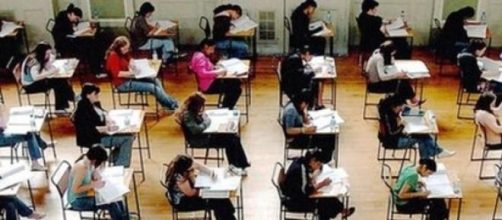Across the country, eleven and sixteen year old Children are sitting for exams; but how much can we read in to theses exam results? Should eleven year olds be subjected to the stresses of such rigorous testing? From a pool of one thousand and ten eleven years old 55% said they believed bad results in their SAT's would damage their chances of success in the future. A further 68% admitted to feeling pressured. More worryingly, one in five parents said their child was too nervous to eat before the exam, 59% said they had skipped breakfast on exam days and one in eight children refused to eat during exam time.
Furthermore 20% admitting they were unable to concentrate due to nerves, and 22% had lost sleep worrying about exams.
The National Union of Teachers findings show pupils self-harming and developing eating disorders because of 'exam factory' conditions faced at school. Should eleven year olds be subjected to such shifts in emotional balance? That question becomes more pertinent when six in ten children claimed to have been told by their teacher that SAT's were important for the league school tables. Claims that teachers coach their pupils to pass the exams to improve the schools pass rate and league standing suggest the process is a pointless exercise in numeracy and 'man management.'
Ever increasing curriculum difficulties within secondary education further pushes the amount of information children are expected to retain; this is coupled with the year on year changes to the GCSE platform.
Do the exams merely show who can learn and regurgitate information the best; is there any real proof of application of learning? One in three pupils eligible for free school meals achieved at least five A* to C GCSE's grades compared to the 60.5% of others. This asks another question; what percentage of our sixteen and eleven year olds are currently living in environments' conducive to the pressures of examinations.
Is there too much of a differential in social living standards within the schools and even within the classroom? Parents and teachers need to ask the question, are the results of testing a fair representation of what is going on in the class room on a day to basis. Should there be more emphasis on year long, year on year, assessment from teachers?
Surely students' knowledge, ability to retain information and more importantly the know how to apply and add context to that knowledge, should be assessed on an on-going basis without the need for the current pressurised environment of GCSE's.
Nobody is saying that there is no validity in tests. A child's learning and progress needs to be measured in order to ensure their learning remains appropriate. There does however need to be perspective. A child's worth, or as they see it, their failure, cannot simply be measured by a piece of paper with a grade on it. Education must always be fit for purpose and the UK's landscape for a child has changed since the birth of GCSE's, so surely now there must be a call for change in the way we examine our children - Great Britain's children - Great Britain's future.

